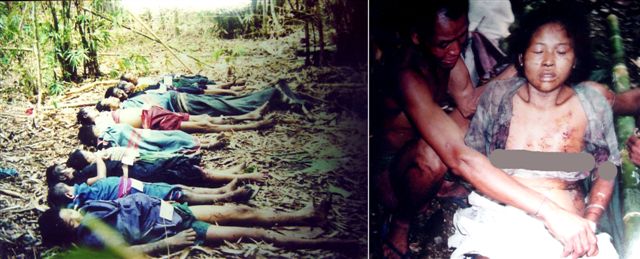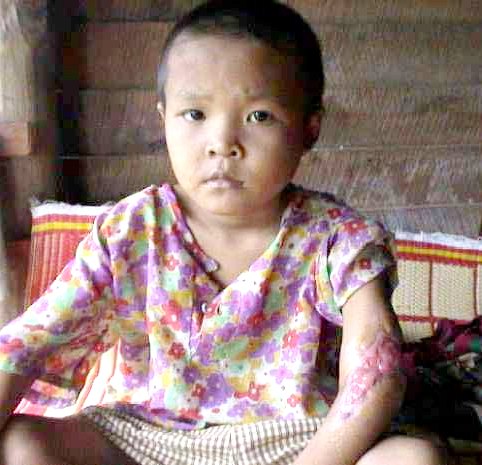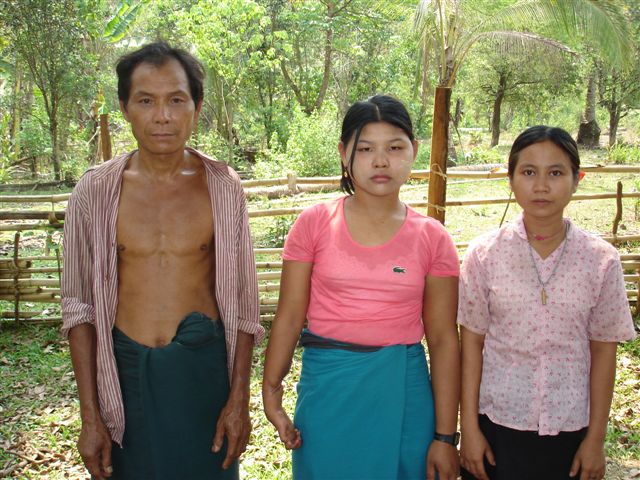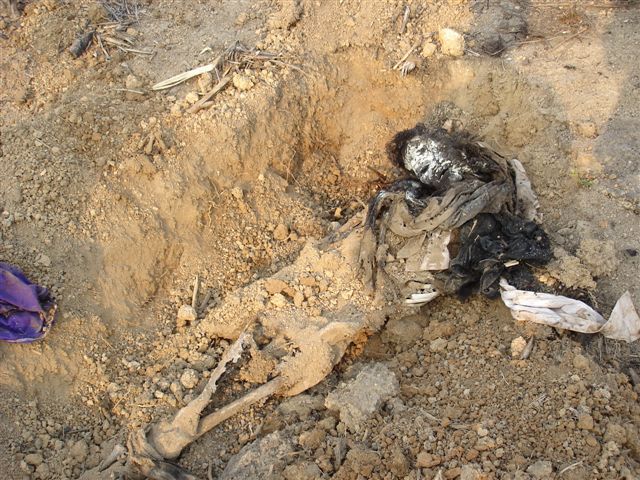|
 |
| 10 of the 12 massacred and Naw Pee Ni, wife of Saw Ko Nu all killed in April 2002, CIDKP |
 |
| Saw Wilbur Htoo,wounded in 02 Massacre, now dead.FBR |
 |
| Saw Ko Nu,wounded daughter and widow of nephew. 17 Apr 08.FBR |
 |
| Remains of nephew, Saw No Maw. 17 Apr 08.FBR |
| Father, Saw Ko Nu, crying for his son 17 Apr 2008. FBR |
(This message is being sent directly from a relief team in the field.)
In 2002, the Burma Army chased a group of villagers in Dooplaya District, central Karen State. They caught up to them at night and killed 12 people, 8 of whom were children. We and other organizations reported on this massacre and went to provide relief to others in the area who were also under attack. During the mission we removed the bullet from an eight-year-old boy, Wilbur Htoo, who had survived the massacre by hiding under the dead body of his grandmother and then running away once the Burma Army had gone. His sister, Naw Tha Ku, was severely wounded in the arm, but also escaped along with their father, Saw Ko Nu.
We are now in the same area six years later and while the people have not given up, (as described in our earlier report of churches being burned and rebuilt), there is still heartbreak here. Four months ago, on Christmas Day 2007, a Burma Army patrol shot at Saw Ko Nu, the father that escaped the massacre in 2002, while he was fishing near his orchard. He managed to run away. Above him on a hillside rice field was his 13-year-old son Wilbur Htoo and 25-year-old nephew, Saw No Maw. After escaping the shooting, the father kept running and hearing no more shooting thought that the son and nephew who were about 500 yards away on higher ground, had escaped. But when they didn’t turn up later, the father went looking for them. He found their burned bodies in the rice field they had been working. When he looked at them, he saw that they had not been shot, but had been captured and tortured to death. Their tendons on their ankles were cut open, they were disemboweled and throats cut. Their bodies were set on fire but only partially burned. A local FBR relief team already sent the story of this killing out earlier, but now we arrived and wanted to document it further and also hold a memorial service for the two that were killed. When we talked to the father, we were hurt in our hearts to learn that he had already lost his wife and three of his children in the 2002 massacre and now he had just lost his son, his nephew and had an injured daughter.We were shocked to learn that his son was the same Wilbur Htoo who had survived the massacre in 2002 but now had been tortured to death. We also met with the wife, Naw Moo Dah, 22 of the dead nephew. She had a nine month old baby who became sick and died two days after her husband was killed, so she is now alone.
The father said he would take us to close to where Wilbur Htoo and his nephew had been killed but he could not bear to go to the exact spot. We took a small team and went with him and as we got close to the killing ground he began to talk about his son. We passed through an orchard they had both been working on and he pointed out the fruit trees his son had helped to tend as well as the field house they had built together. After passing through the orchard we had to climb a hill to where the rice field was. At that point he decided he would go with us all the way. In the rice field we found the partially buried remains of his nephew and the place his son was buried. When he saw them, the father began to shake and call his son’s name. I held him in my arms and he began to cry. All I could do was pray and try to comfort him. After he had composed himself he went down to the site of his son’s remains and began to call for his son, talk to his son and talk to God, saying, “Oh my son, my son, I tried my best for you. I planned many good things for you, but now you have no chance to enjoy them. Oh, my son, my son. Oh God. Oh my son, my son, you go ahead and wait for me.” And then he stood up and said, “Oh God, Oh God, if you don’t help me I can’t continue on.”
One of the team members talked with the father while the rest of us reburied the nephew and covered his remains. We then gathered together with the father and held a memorial for the two who had been killed. We prayed, sang the hymn “Holy, Holy, Holy” and said The Lord’s Prayer together. All this time the father, joined us in silence. But when we closed with the song, “Hear Our Prayer, O Lord,” he joined in and sang with us. We asked for the justice of God, and that God would bless this ground. The father turned to us and nodded his head, as if to say, “It is finished.”
We know this is a wound that will never leave him. I told him that I have three children myself and I think I would be crying and in pain my whole life if I lost them. We also told him that we believe that his son and family are safe in God’s hands and that one day we will be reunited. Now we are still on this earth and we have our duty to do what is right and good and to love each other. As we walked down the hill it seemed to me that he felt satisfied that we had together done the best we could do.
We want to thank all of you who stand with the people of Burma in the midst of these atrocities. We ask you to pray and to think about what we can do together to help make Burma a better place and in the meantime how can we comfort and help people like this man who has lost most of his family.
Thank you and God Bless you,
A Relief Team Leader
Dooplaya District, Karen State, Burma

